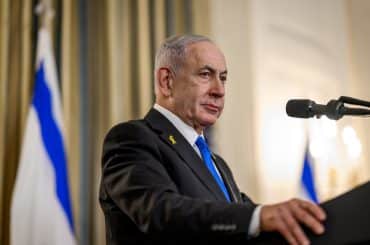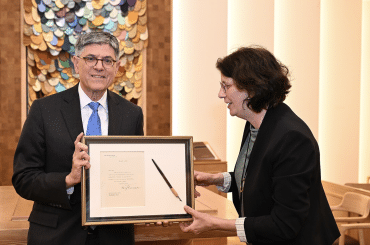Michael Douglas, in his op-ed piece in last Sunday’s LA Times, “Finding Judaism, facing anti-Semitism”, tells a compelling story about his young son encountering an anti-Semite at a hotel pool in southern Europe who shouted insults at him because he was wearing a Star of David. While everyone can agree it’s important to stand up against anti-Semitism, it’s also important to reject false claims of anti-Semitism used as an ad hominem sword to protect Israel and the actions of its government from criticism. Where real anti-Semitism is present, as in the despicable incident involving Michael’s young son, it needs to be named and shamed and hopefully soon eradicated. Where it’s not, where it’s used as a tactic to protect Israel from valid criticism, we need to reject it and avoid the slippery slope that reduces claims of anti-Semitism to little more than political theatre.
Douglas goes down that slippery slope when he says,
A second root cause of anti-Semitism derives from an irrational and misplaced hatred of Israel. Far too many people see Israel as an apartheid state and blame the people of an entire religion for what, in truth, are internal national policy decisions.
First, it’s not anti-Semitic to criticize Israel and its government for its policies or actions any more than it’s anti-Russian to criticize Putin’s government for its interference in the Ukraine. Criticism of Israel doesn’t necessarily indicate an anti-Semitic motive or hatred of all Jews. Certainly, some who criticize Israel are anti-Semites (David Duke comes to mind), but again, that doesn’t mean all criticism of Israel is anti-Semitism.
Israel can’t be held immune to criticism simply because it is Israel and most of its citizens are Jewish. Tarring all who criticize Israel with the anti-Semitic brush is its own form of bigotry, and placing any individual or country above criticism sets a dangerous precedent.
Second, Douglas says too many people see Israel as an apartheid state and blame all Jews for what are really internal national policy decisions. It’s true the charge of apartheid within Israel’s pre-1967 borders is debatable since all Israeli citizens, both Jews and Palestinians, have civil rights, including the right to vote. However, there are some 50 laws in Israel that discriminate against Palestinian citizens of Israel in favor of Jews.
The undeniable problem lies in Greater Israel, specifically in the Palestinian territories Israel captured and occupied in 1967. There the apartheid charge has a great deal of validity. In the West Bank, Gaza, and East Jerusalem, there are 4.5 million Palestinian Arabs who have lived under Israeli military control and occupation without civil rights or the right to vote for almost half a century. At most these Palestinians have very limited voting rights within the truncated areas of the occupied territories. They vote for local leaders who have virtually no control over Israel’s hegemony in the occupied territories. They live under a harsh military occupation and have no say whatsoever in the national policy or leadership of the Greater Israel that totally controls their borders, their travel, their natural resources, in short, their entire lives. Self-rule and voting rights for the Palestinians of the occupied territories is little different than that of the Bantustans of apartheid South Africa.
Michael Douglas visits the City of David in occupied East Jerusalem in June, 2014.
In 2012, Stephen Robert, the former chancellor of Brown University and a Jewish-American and major life-long supporter of Israel, concluded, after a humanitarian aid trip to East Jerusalem and the West Bank, that “… Israel has created a system of apartheid on steroids.” Depriving 4.5 million people of their most basic civil rights for half a century based on their ethnicity certainly looks like apartheid. Moreover, under those circumstances, Palestinian resistance and hatred of Israel seems understandable.
Third, Douglas criticizes those who label Israel’s actions as apartheid for interfering in what he sees as merely Israel’s “internal national policy decisions”. In other words, whatever the Israeli government decides is above criticism because it’s really just making decisions involving internal matters of national policy. Douglas is on shaky ground here. Would he apply that standard to those who criticized the internal national policy decisions of the Rwandan government during the genocide of the Tutsi, of the Khmer Rouge government in Cambodia, or of the South African apartheid regime?
No country, including Israel can be held immune from valid criticism. Douglas would do well to think about one looming fact: In this week’s election in Israel, the so-called “only democracy in the Middle East”, 35 percent of the population of Greater Israel, the non-Jewish population of the West Bank, Gaza, and East Jerusalem, weren’t allowed to vote even though they’ve been under Israel control and occupation for nearly half a century. That’s 4.5 million people who have been waiting to for their freedom and basic human civil rights for now 48 years. They live, unfortunately, in what most Israelis see as Judea, Samaria, and Jerusalem, the Eretz Yisrael of their Old Testament dreams. Does Douglas really believe a 2000 year old claim based on the Old Testament should be allowed to trump the basic human rights of 4.5 million indigenous Palestinians?
Douglas and his wife, Catherine Zeta-Jones, should be admired for having given back by being leaders in a wide variety of worthwhile progressive causes. As a Jew, he should be concerned about stopping the scourge of anti-Semitism, as should we all, but as a Jewish progressive he should also be concerned about the current direction of Zionism, particularly the Zionism practiced by the hard-right Likud party and its now reelected leader, Benjamin Netanyahu. The question he should ask is whether Israeli Zionism, as practiced today, is consistent with Jewish values, and American values.
I would hope that Douglas would avoid the trap of equating Zionism with Judaism. Zionism is a very modern and recent offshoot of Judaism, one of the world’s oldest and most noble religions. Whether this offshoot, in its present form, is consistent with the values and precepts of Judaism is a question for Douglas to answer. I would hope he would follow the example of Brown University Chancellor Stephen Robert and take his wife and son on an investigative journey to the occupied Palestinian territories, and then come to his own conclusions and give us a 2015 update.



Thanks for taking this on, Gil. I read the op-ed earlier this week with dismay.
Well dissected in toto.
Your last paragraph is one for all people to ponder:
“I would hope that Douglas would avoid the trap of equating Zionism with Judaism. Zionism is a very modern and recent offshoot of Judaism, one of the world’s oldest and most noble religions. Whether this offshoot, in its present form, is consistent with the values and precepts of Judaism is a question for Douglas to answer. I would hope he would follow the example of Brown University Chancellor Stephen Roberts’ and take his wife and son on an investigative journey to the occupied Palestinian territories, and then come to his own conclusions and give us a 2015 update.”
One can hear from many travelers to the OPT that unless you see it/feel it/ visit it, you’d never believe it. Gideon Levy and others have said that very few Israelis even know a Palestinian, much less visit the OPT.
Michael Douglas and his son should visit.
(It’s so lovely that you honor your honorable father by following in his footsteps in your own way)
“Second, Douglas says too many people see Israel as an apartheid state and blame all Jews for what are really internal national policy decisions.”
Well, as to seeing Israel as an apartheid state, true. How, by the way, does Douglas see it?
As to blaming all Jews for what Israel does, that’s trickier: not all Jews support Israel’s policies and practices. There are Jews who condemn the settlements and yet profess to love and honor and protect Israel. There are Jews who say Israel can do no wrong and others who say Israel can do wrong but cannot be blamed or punished for doing so.
However, broadly speaking, Jews in the USA have made it appear (or permitted it to appear) that they support Israel and regard criticism of Israel (to say nothing of action against Israel) as antisemitic. And,l broadly speaking, it is these actions (or failures to act) which make it appear to many people that “all Jews” are guilty of whatever crimes Israel commits. Especially as Israel claims — sometimes with help from outside — that it is the national state of the Jewish people.
Douglas and his basic instinct to defend the indefensible
http://www.imdb.com/title/tt0103772/quotes
Catherine: Killing isn’t like smoking. You can stop.
Except Israel can’t.
Nick: What’s your new book about?
Catherine: A Ziobot . He falls for the wrong ideologue.
Nick: What happens to him?
Catherine: She kills him.
Gus: Everyone she plays with dies.
Nick and the people of Gaza : I know what that’s like.
https://www.youtube.com/watch?v=yjqAHPu097c
The Star of David, in addition to being a symbol of Judaism, is also an official symbol of the State of Israel. Do we know for a fact that it was not because of the star’s second role that abuse was shouted at Douglas’s son?
Michael Douglas is an entitled and privileged son of the ruling class and has been since birth. It speaks to the insanity of the Zionist culture that he views himself as a victim of society.